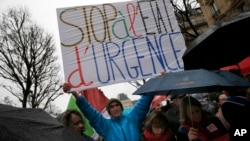Several thousand people marched in French cities on Saturday to protest against a state of emergency introduced after November's attacks in Paris and a proposed nationality-stripping law that led France's justice minister to quit this week.
President Francois Hollande's Socialist government adopted state of emergency legislation following the November 13 Islamist militant attacks that left 130 people dead, and it plans to extend the measures for three months after they expire next month.
Opponents say the increased police powers and restrictions on public gatherings damage democracy and are ineffective in tackling terrorist threats. The debate has become intense as the government has pursued plans to deprive convicted terrorists of French nationality.
Paris attracted the biggest march as 5,500 protesters, according to a police estimate, went from the traditional rallying point of Republic square through central Paris before dispersing near the Louvre museum.
The organizers said 20,000 joined the Paris protest. Smaller marches took place in other French cities such as Toulouse and Marseille as part of protests planned in 70 towns.
"I think it's more than dangerous, the extension of the state of emergency," Alexandra Scappaticci, one of the protesters in Paris, told Reuters.
"It has already been used during the COP 21 [climate talks] to lock down demonstrators who had nothing to do with terrorism, so I think that if it is extended, I don't know what more they could use it for. But in any case, it will not prevent terrorism."
The Socialist government has the backing of most French people for the emergency measures and the wider use of nationality-stripping, opinion polls show. But it has angered some left-wing political allies, and Justice Minister Christiane Taubira, who had deep reservations about the reforms, resigned this week.





